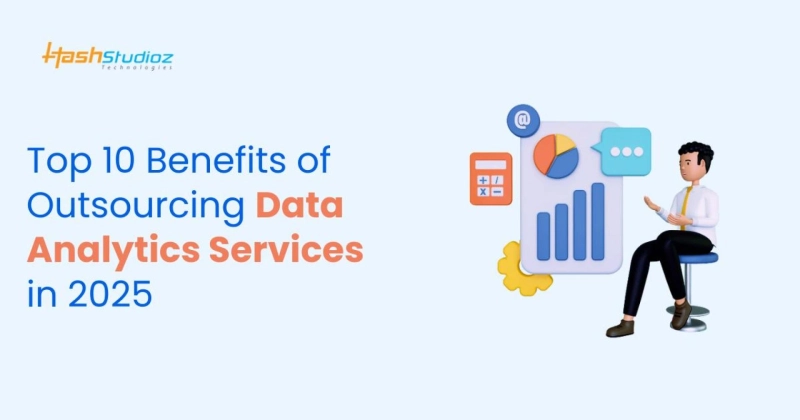In 2025, data has evolved from being a mere byproduct of business operations to becoming one of the most important assets that companies can leverage to gain a competitive edge. The sheer volume of data generated daily presents both a significant challenge and opportunity for businesses worldwide. With businesses increasingly looking for ways to capitalize on data analytics, outsourcing data analytics services has become an essential strategy.
- 65% of businesses that outsource data analytics report significant improvements in decision-making efficiency.
- 55% of companies using data analytics services experienced reduced operational costs.
- Businesses leveraging data analytics are 23% more likely to outperform their competitors.
What is Data Analytics Outsourcing?
Outsourcing data analytics services involves hiring external experts or a data analytics company to manage and analyze your business data. This means you don't have to hire in-house teams to perform data analytics, which can be a complex and resource-intensive task. By leveraging the services of a skilled data analytics team, businesses can unlock valuable insights from their data without the associated overheads of building and maintaining an in-house team.
Outsourcing can be done in several ways, such as contract-based work, long-term partnerships, or even through cloud-based data analytics solutions provided by third-party vendors.
Key Advantages of Outsourcing Data Analytics Services
1. Cost Efficiency
One of the most compelling reasons to hire a data analyst or outsource data analytics services is the cost-saving benefit. Hiring a full-time team of data scientists, analysts, and engineers is expensive, especially when considering salaries, benefits, and training expenses.
By outsourcing data analytics, companies can access the expertise they need at a fraction of the cost. Most data analytics companies offer flexible pricing models, including pay-as-you-go or subscription-based models, which ensure companies only pay for what they need. This enables businesses to scale analytics efforts without investing heavily in infrastructure or personnel.
Key Points
- Reduced overheads for staffing and infrastructure.
- More affordable access to high-end tools and software.
- Flexible pricing models suited to different budgets.
2. Access to Expertise and Skilled Professionals
The field of data analytics requires specialized knowledge and skills, which many organizations struggle to build internally. When you hire data analysts through an outsourcing partner, you gain immediate access to seasoned professionals with deep expertise in data analysis, machine learning, data engineering, and predictive analytics.
These professionals are experienced in handling complex data sets, deriving actionable insights, and utilizing advanced technologies. As a result, businesses that partner with data analytics services gain a competitive advantage by utilizing cutting-edge solutions without having to train or hire specialized staff.
Key Points
- Immediate access to top-tier talent and expertise.
- Knowledge of the latest trends and tools in the analytics space.
- Experience with diverse industries and data challenges.
3. Focus on Core Business Functions
Outsourcing non-core functions such as data analytics allows businesses to focus on their primary objectives. Instead of dedicating time and resources to managing an in-house team of analysts, companies can direct their attention to what they do best—whether it's product development, customer service, or marketing.
When a business partners with a trusted data analytics company, they can ensure that their data needs are handled expertly, allowing them to concentrate on growth and strategy.
Key Points
- Streamlined business operations by outsourcing non-core functions.
- Enhanced focus on innovation and strategy.
- Freed-up resources to allocate to core business areas.
4. Advanced Technologies and Tools
Data analytics services often have access to state-of-the-art tools, software, and technologies that businesses may not be able to afford or implement on their own. Whether it's advanced machine learning algorithms, artificial intelligence models, or cutting-edge data visualization platforms, outsourcing gives companies the ability to tap into these tools without investing in expensive infrastructure.
Moreover, the data analytics solutions provided by outsourcing companies are constantly evolving, ensuring that businesses always have access to the latest technological advancements in the field.
Key Points
- Access to the latest tools and technologies.
- Reduced investment in software and hardware.
- Continuous updates and innovations from external experts.
5. Enhanced Data Security and Compliance
Security is a critical concern when dealing with sensitive business data. By outsourcing data analytics to experienced professionals, businesses can benefit from enhanced data security practices and industry-specific compliance measures.
Many data analytics companies are well-versed in the legal frameworks surrounding data privacy (such as GDPR or CCPA), ensuring that businesses remain compliant while handling sensitive data. Furthermore, these companies often employ advanced encryption, secure data storage, and other safeguards to ensure that data remains protected throughout the analytics process.
Key Points
- Adherence to global data privacy laws and regulations.
- Advanced security protocols to protect sensitive business information.
- Reduced risk of data breaches and penalties.
6. Scalability and Flexibility
Outsourcing data analytics services offers unparalleled flexibility when scaling operations. Whether a business needs to analyze a small set of data or process massive datasets, data analytics services can quickly scale up or down to meet the changing demands of the business.
This scalability ensures that companies don’t need to worry about hiring new staff or purchasing new infrastructure as their data needs grow. Outsourcing data analytics solutions is a dynamic and cost-effective way to manage growing data requirements.
Key Points
- Easily scale up or down based on business needs.
- Adapt quickly to fluctuations in data volume or complexity.
- Flexible engagement models to suit both short-term and long-term projects.
7. Faster Time to Insights
Outsourcing data analytics can dramatically shorten the time required to gain valuable insights from data. Professional analysts are able to process data more efficiently, identify trends, and deliver actionable insights faster than an in-house team might be able to.
Moreover, external analytics teams often follow streamlined processes and employ advanced automation tools that accelerate the data processing and analysis phases. This results in quicker decision-making, which is critical for businesses looking to maintain a competitive edge in fast-paced markets.
Key Points
- Accelerated data processing and reporting timelines.
- Quicker insights lead to faster decision-making.
- Enhanced ability to respond to market changes promptly.
8. Improved Decision-Making
Data-driven decision-making is at the heart of modern business strategies. Outsourcing data analytics allows businesses to make more informed, objective, and accurate decisions.
External data analytics teams bring a fresh perspective to problem-solving, applying their expertise to analyze data from various angles. By leveraging the insights derived from these analyses, companies can make decisions backed by solid data, improving the accuracy and outcomes of their business strategies.
Key Points
- Data-backed decisions lead to better business outcomes.
- Reduced bias in decision-making.
- Insights from diverse perspectives and analytical approaches.
9. Risk Mitigation
When it comes to data handling and analysis, the risk of human error or incorrect interpretation is always a concern. Outsourcing data analytics services to professionals minimizes the risk of mistakes that could lead to inaccurate analyses and flawed business decisions.
Moreover, data analytics services come with risk management strategies, including predictive analytics, which can help identify potential business risks before they escalate. This proactive approach enables businesses to mitigate risks and protect their long-term success.
Key Points
- Reduced risk of human error in data analysis.
- Predictive analytics to identify and mitigate potential risks.
- Professional management of potential data-related challenges.
10. Innovation and Competitive Advantage
Outsourcing data analytics allows companies to stay ahead of the curve. A professional data analytics company not only processes and analyzes data but also provides innovative insights and actionable recommendations to propel businesses forward. By embracing cutting-edge analytics, companies gain a competitive advantage by uncovering trends, market gaps, and opportunities that may have gone unnoticed otherwise.
Key Points
- Access to innovative insights and strategies.
- Uncover hidden business opportunities and trends.
- Continuous learning and adaptation to market dynamics.
Conclusion
Outsourcing data analytics services offers a wealth of benefits that go far beyond mere cost reduction. By hiring a data analyst or partnering with a data analytics company, businesses can gain access to world-class expertise, cutting-edge technology, and faster decision-making capabilities, all while mitigating risks and ensuring compliance.
In today’s data-driven world, outsourcing data analytics services is not just a smart choice; it’s a critical strategy for staying competitive and achieving sustainable growth.
Frequently Asked Questions (FAQ)
Q1: What is the cost of outsourcing data analytics services?
The cost varies depending on the complexity of the data, the type of service required, and the duration of the project. However, outsourcing tends to be more cost-effective compared to maintaining an in-house team.
Q2: How can I choose the right data analytics company?
Look for a company with experience in your industry, a track record of delivering successful analytics projects, and expertise in the tools and technologies that suit your needs.
Q3: What tools do data analytics companies use?
Data analytics companies use a wide variety of tools, including but not limited to Tableau, Power BI, SQL, Python, R, and machine learning platforms like TensorFlow or SAS.


